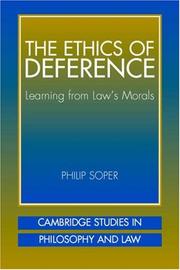| Listing 1 - 10 of 32 | << page >> |
Sort by
|
Book
ISBN: 0190273437 0190273410 Year: 2019 Publisher: New York : Oxford University Press,
Abstract | Keywords | Export | Availability | Bookmark
 Loading...
Loading...Choose an application
- Reference Manager
- EndNote
- RefWorks (Direct export to RefWorks)
"This is a descriptive account of the concept and practice of deference in the law, with the goal of providing a definition and analytical framework that can be applied to all of the many forms of deference that appear in any legal system. Deference is central to almost everything that happens in law but has not been the subject of systematic study, perhaps because it shows up in so many different forms and places. We hope to provide a definition and vocabulary for the study of deference that anyone, from any perspective, can use"--
Book
ISBN: 0198921675 0198921659 Year: 2024 Publisher: Oxford : Oxford University Press,
Abstract | Keywords | Export | Availability | Bookmark
 Loading...
Loading...Choose an application
- Reference Manager
- EndNote
- RefWorks (Direct export to RefWorks)
This text explores the theoretical and practical dimensions of deference in six common law jurisdictions to answer two key questions: what devices courts should use to exercise deference, and how to make deference more workable for judges and predictable for litigants.
Deference (Law) --- Human rights. --- Administrative procedure. --- Law. --- Jurisprudence & general issues.
Book
ISBN: 3429014697 9783429014698 Year: 1992 Volume: 8 Publisher: Würzburg: Echter,
Abstract | Keywords | Export | Availability | Bookmark
 Loading...
Loading...Choose an application
- Reference Manager
- EndNote
- RefWorks (Direct export to RefWorks)
Respect --- #GROL:SEMI-248.145.2 --- Deference --- Esteem --- Conduct of life

ISBN: 1280532246 9786610532247 0198033710 0195303059 0195147782 9780195147780 1429410418 9781429410410 9780198033714 9781280532245 6610532249 9780195303056 0197731554 Year: 2001 Publisher: Oxford ; New York : Oxford University Press,
Abstract | Keywords | Export | Availability | Bookmark
 Loading...
Loading...Choose an application
- Reference Manager
- EndNote
- RefWorks (Direct export to RefWorks)
Reverence is an ancient virtue dating back thousands of years. It survives among us in half-forgotten patterns of behaviour and in the vestiges of old ceremonies. Yet, Paul Woodruff says, we have lost sight of reverence. This short, elegiac volume makes an impassioned case for the fundamental importance of the forgotten virtue of reverence, and how awe for things greater than oneself can - indeed must - be a touchstone for other virtues like respect, humility, and charity. Ranging widely over diverse cultural terrain - from Philip Larkin to ancient Greek poetry, from modern politics to Chinese philosophy - Woodruff shows how absolutely essential reverence is to a well-functioning society.
Honor. --- Respect. --- Deference --- Esteem --- Conduct of life --- Honour --- Chivalry --- Holy, The. --- Awe.

ISBN: 9780521152877 9780521874618 9780511487590 9780511355646 0511355645 0511487592 0521874610 0521152879 1107181720 9781107181724 1281153427 9781281153425 9786611153427 661115342X 1139132849 9781139132848 0511355122 9780511355127 0511354584 9780511354588 0511354002 9780511354007 Year: 2007 Publisher: Cambridge : Cambridge University Press,
Abstract | Keywords | Export | Availability | Bookmark
 Loading...
Loading...Choose an application
- Reference Manager
- EndNote
- RefWorks (Direct export to RefWorks)
We prize loyalty in our friends, lovers and colleagues, but loyalty raises difficult questions. What is the point of loyalty? Should we be loyal to country, just as we are loyal to friends and family? Can the requirements of loyalty conflict with the requirements of morality? In this book, originally published in 2007, Simon Keller explores the varieties of loyalty and their psychological and ethical differences, and concludes that loyalty is an essential but fallible part of human life. He argues that grown children can be obliged to be loyal to their parents, that good friendship can sometimes conflict with moral and epistemic standards, and that patriotism is intimately linked with certain dangers and delusions. He goes on to build an approach to the ethics of loyalty that differs from standard communitarian and universalist accounts. His book will interest a wide range of readers in ethics and political philosophy.
General ethics --- Loyalty --- Conduct of life --- Constancy --- Loyalty. --- Respect. --- Deference --- Esteem --- Arts and Humanities --- Philosophy
Book
ISBN: 3110448130 311052628X 3110448149 Year: 2017 Publisher: Berlin / Boston De Gruyter
Abstract | Keywords | Export | Availability | Bookmark
 Loading...
Loading...Choose an application
- Reference Manager
- EndNote
- RefWorks (Direct export to RefWorks)
Despite the increasing concern for the issue of respect for persons displayed over the last decades by political philosophers, human-right thinkers, social and ethical theorists, a comprehensive treatment of the problem at stake from a historical-philosophical perspective is conspicuously absent. The present collection of essays aims to contribute to the fulfillment of this gap by offering a reconstruction of the seminal passages in the history of philosophy which testify to the evolution of the idea of respect for persons and the rich array of conceptual specifications that such an idea acquires across the centuries.By analysis of pivotal texts of ancient and modern contemporary philosophy, the volume will try to offer an articulated account of respect which, starting from its primeval connection with the search for esteem and the pursuit of human excellence, gradually evolves towards the recognition of the political status of each citizen and culminates into a true politics of human rights.Bringing together the expertise of classicists and scholars specialized in modern and contemporary philosophy, the volume is especially intended for scholars working in the fields of the history of philosophy, ethical and political theory.
Respect for persons --- Respect for persons. --- Respect. --- History. --- dignity. --- recognition. --- self esteem. --- Deference --- Esteem --- Conduct of life --- Persons
Book
ISBN: 3957439426 9783957439420 9783897857315 3897857316 133602691X Year: 2012 Publisher: Paderborn : mentis,
Abstract | Keywords | Export | Availability | Bookmark
 Loading...
Loading...Choose an application
- Reference Manager
- EndNote
- RefWorks (Direct export to RefWorks)
Ob es um den Kopftuchstreit geht oder um die Bedeutung von anständig bezahlter Arbeit, um die Pflichten gegenüber Armen oder um den Umgang mit Tieren und der Natur: 'Respekt' und 'Anerkennung' gehören zu den wichtigsten moralischen Begriffen unserer Zeit. In allen Fällen geht es grundlegend um die Frage, was Menschen einander und anderen Lebewesen moralisch schulden und warum. Allerdings ist in der philosophischen Diskussion vielfach unklar, was die Begriffe jeweils bedeuten und ob sie konzeptionell zusammenpassen. Es ist daher ein Anliegen dieses Buches, die Begriffe grundlegend zu klären, eine vermeintliche Konkurrenz aufzulösen und beide Prinzipien in eine Konzeption zu integrieren. Der erste Begriff 'Respekt' ist dabei als ein basales normatives Prinzip zu verstehen, welches sich auf fundamentale moralische Ansprüche richtet, das heißt im Fall von Menschen auf ihren Anspruch, in ihrer Würde, ihrer Autonomie, ihrer Freiheit und ihren grundlegenden Interessen geachtet zu werden. Allein dies reicht aber für ein würdevolles und gutes Leben nicht aus: Der zweite Begriff der 'Anerkennung' geht darüber hinaus und richtet sich auf konkrete Bedürfnisse und Leistungen. Berücksichtigt man dann noch die Wichtigkeit von verwandten moralischen Einstellungen wie Toleranz, Rücksicht und Mitgefühl, so entsteht ein anspruchsvolles multikriterielles Ethikmodell, welches adäquat auf die Herausforderungen unserer pluralen und multikulturellen Gesellschaften antwortet.
Respect. --- Recognition (Philosophy) --- Ethics, Modern. --- Social ethics. --- Ethics --- Social problems --- Sociology --- Modern ethics --- Philosophy --- Deference --- Esteem --- Conduct of life --- Moral and ethical aspects.
Book
ISBN: 9781108490979 9781108867108 9781108792035 Year: 2021 Publisher: Cambridge, United Kingdom ; New York, NY : Cambridge University Press,
Abstract | Keywords | Export | Availability | Bookmark
 Loading...
Loading...Choose an application
- Reference Manager
- EndNote
- RefWorks (Direct export to RefWorks)
"Introduction Deference and the International Adjudication of Private Property Disputes While working as a government lawyer in 2011, a letter came into our office advising that the Philip Morris tobacco company had decided to sue Australia under a bilateral investment treaty. The company contended that Australia's tobacco plain packaging requirements breached its intellectual property rights, entitling it to billions of dollars in compensation under international law. This news was not particularly shocking to the small team of which I was part, which had been assembled within the government's Office of International Law to respond to these types of claims. The news was shocking, though, to the wider Australian community. Over the ensuing months, the community's disbelief became better-articulated in the press: How can an international tribunal sit in judgment over a measure which the Australian Parliament had decided was in the public interest after extensive scientific enquiry and public consultation? Could an international tribunal really reverse the finding of Australia's highest court that the legislation was lawful?"--
Arbitration (International law) --- Judicial process. --- Deference (Law) --- Jurisdiction (International law) --- Judicial review --- Arbitrage international --- Processus judiciaire --- Juridiction (droit international) --- Contrôle juridictionnel des lois --- Contrôle juridictionnel des lois

ISBN: 1107132347 1280418435 0511178131 1139147714 0511073933 0511073755 0511305451 051161389X 0511073836 9780511073939 9780511073755 9780511073830 9780521810470 0521810477 0521008727 9780521008723 9780511613890 9781280418433 Year: 2002 Publisher: Cambridge, UK ; New York : Cambridge University Press,
Abstract | Keywords | Export | Availability | Bookmark
 Loading...
Loading...Choose an application
- Reference Manager
- EndNote
- RefWorks (Direct export to RefWorks)
Do citizens have an obligation to obey the law? This book differs from standard approaches by shifting from the language of obedience (orders) to that of deference (normative judgments). The popular view that law claims authority but does not have it is here reversed on both counts: law does not claim authority but has it. Though the focus is on political obligation, the author approaches that issue indirectly by first developing a more general account of when deference is due to the view of others. Two standard practices that political theorists often consider in exploring the question of political obligation - fair-play and promise-keeping - can themselves be seen as examples of a duty of deference. In this respect the book defends a more general theory of ethics whose scope extends beyond the question of political obligation to questions of duty in the case of law, promises, fair play and friendship.
Deference (Law) --- Law and ethics. --- Rule of law. --- Law --- Supremacy of law --- Administrative law --- Constitutional law --- Ethics and law --- Law and morals --- Morals and law --- Interpretation and construction --- Philosophy --- Obedience (Law) --- Legal obligation --- Obligation, Legal --- Obligation to obey the law --- Arts and Humanities --- DROIT --- DROIT NATUREL --- ETHIQUE --- RESPECT --- DEFERENCE --- DROIT ET MORALE --- PHILOSOPHIE
Book
ISBN: 1626160341 9781626160347 9781626160330 1626160333 Year: 2014 Publisher: Washington, District of Columbia : Georgetown University Press,
Abstract | Keywords | Export | Availability | Bookmark
 Loading...
Loading...Choose an application
- Reference Manager
- EndNote
- RefWorks (Direct export to RefWorks)
How can we agree to disagree in today's pluralistic society, one in which individuals and groups are becoming increasingly polarized by fierce convictions that are often at odds with the ideas of others? Civil Disagreement: Personal Integrity in a Pluralistic Society shows how we can cope with diversity and be appropriately open toward opponents even while staying true to our convictions. This accessible and useful guide discusses how our conversations and arguments can respect differences and maintain personal integrity and civility even while taking stances on disputed issues. The author exa
Pluralism. --- Respect. --- Integrity. --- Courtesy. --- Monadology --- Monism --- Philosophy --- Reality --- Deference --- Esteem --- Conduct of life --- Honesty --- Reliability --- Civility --- Courteous behavior --- Courteousness --- Discourteous behavior --- Discourteousness --- Graciousness --- Impoliteness --- Manners --- Polite behavior --- Politeness --- Rudeness --- Ungraciousness --- Etiquette
| Listing 1 - 10 of 32 | << page >> |
Sort by
|

 Search
Search Feedback
Feedback About UniCat
About UniCat  Help
Help News
News